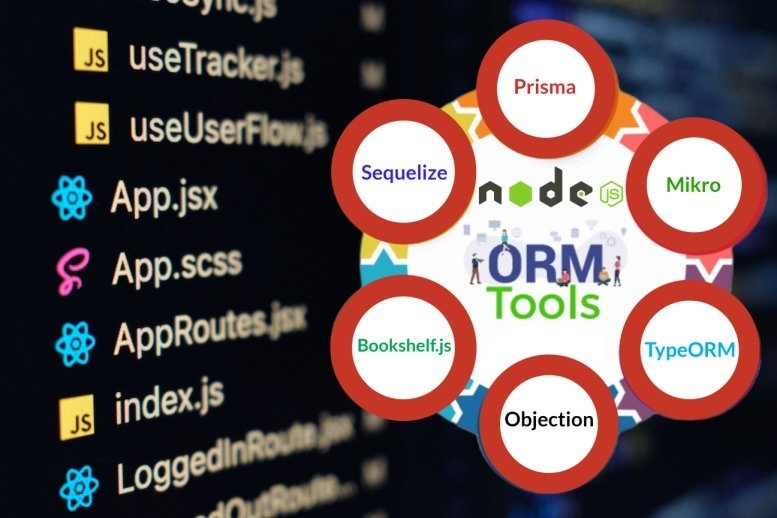6 Best ORMs for Modern Node.js App Development

There is no denying that developing powerful and interactive Node.js applications need database interactions. Object-Relational Mapping (ORM) libraries are one of the key tools for new-age Node.js app development when you want to interact with the database.
These libraries make it easy for database operations by letting you work with JavaScript objects instead of writing complex SQL queries- saving you time and effort.
Here is a complete guide to help you understand the ORM tool and its importance before exploring the top 6 options for new-age Node.js app development.
Let’s Get Started!
The Meaning of Object-Relational Mapping or ORM
It is one of the most productive tools that fills the gap between the object-driven nature of application code and the relational structure of databases. ORM is a technique that enables JavaScript developers to easily interact with databases using object-oriented programming languages.
It creates a map of object-oriented classes to database tables and columns and lets developers manipulate them using ORM constructs.
Here are some of the key benefits of ORMs when Developing Modern Node.js apps:
Higher Productivity: ORMs allow developers to improve their productivity by automating multiple tasks when interacting with databases, such as managing database connections and writing SQL queries.
- Better Quality of Code: ORMs can do wonders in boosting the quality of database-oriented apps by minimizing the amount of complex manual coding that needs to be maintained properly.
- Minimised Errors: It can help you reduce unwanted errors in database-oriented apps by creating a layer of abstraction between the database and the app.
6 Best ORM Tools for Modern Node.js App Development
- Sequelize
It is one of the most popular ORMs for new-age Node.js apps. It can work with multiple databases, such as MySQL, PostgreSQL, SQLite, and MSSQL. By accommodating Promise APIs, it supports various coding styles to simplify the app development process. Have a look at the advantages and disadvantages of the Sequelize ORM tool:
Benefits:
- A huge community and great documentation
- Supports multiple database systems
- Easy migrations and schema changes
- A huge query builder.
Drawbacks
- A complex tool, especially for beginners
- Lengthy APIs
Sequelize is ideal if you want multiple database systems and complex relationships between data models in your upcoming project.
- Prisma
Prisma is a modern database toolkit and Object-Relational Mapping (ORM) tool for Node.js and TypeScript. It simplifies database access and management by letting developers work with databases using a strongly typed, auto-generated query builder and schema. This tool supports multiple databases, including PostgreSQL, MySQL, SQLite, and SQL Server. It provides a convenient and efficient way to define data models, query the database, and handle migrations.
Benefits:
- Great TypeScript integration
- Robust query builder
- Easy Database migrations
- Schema-first design
- Extensive community and support
Drawbacks:
- Restricted support for NoSQL databases
- A New and unfamiliar ORM system
Prisma is a great tool if type safety and new-age tooling are your major concern.
- Bookshelf.js
It is a minimalistic and flexible ORM tool that’s developed on top of the Knex.js query builder. Bookshelf.js is designed to work with PostgreSQL, MySQL, and SQLite. The best part is that it offers a simple API for defining models and relationships. Isn’t it Amazing?
Benefits:
- Easy to use and lightweight
- Ideal for small projects
- It can fulfill your basic database requirements
Drawbacks:
- Limited features as compared to other tools
- Not ideal for complex and large applications
Bookshelf.js is a great option for small app development projects because it supports simple database requirements and is ideal for beginners.
- TypeORM
It is one of the best ORM tools that works efficiently with TypeScript and supports developers with complex database requirements. It is a favorite tool among developers, especially those who prefer static typing. The best part is that it supports multiple databases, such as PostgreSQL, MySQL, SQLite, MariaDB, and Oracle.
Benefits:
- Robust TypeScript Support
- Intuitive decorator-based syntax
- Great support for migrations
- Active development
Drawbacks
- Restricted Support for NoSQL databases
- Non Efficient
- Lack of Maintenance and support
It is a great option for projects prioritising TypeScript.
5. Mikro-ORM
It is a TypeScript-based Object-Relational Mapping (ORM) library designed for Node.js and the Deno runtime. It specializes in working with various SQL databases, including MySQL, PostgreSQL, SQLite, and SQL Server. Mikro-ORM focuses on providing a powerful and efficient way to interact with databases while maintaining a simple and elegant API.
Benefits:
- Supports Solid Typing
- Supports SQL and NoSQL databases
- Automated Migrations
- High-Performance Tool
Drawbacks
- Limited Community
- Lack of Advanced Features
- Objection.js
Objection.js is developed on top of the Knex.js query builder and offers a simple and intuitive way to define models and relationships. It’s designed to work with PostgreSQL, MySQL, SQLite, and MSSQL.
Benefits:
- Easy Query Builder
- Supports complex databases
- Great documentation
- Powerful community support
Drawbacks
- Restricted support for NoSQL databases
- Difficult for beginners
It is a great option for developers who need an easy query builder.
Conclusion
These are the 6 most renowned ORMs for modern Node.js App development to make the job of developers easy when it comes to dealing with multiple databases.





